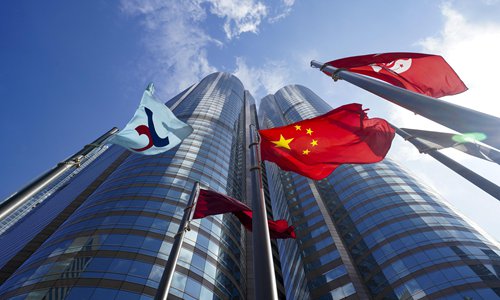SOURCE / MARKETS
HKEX sets records in turbulent H1
Strong IPO market offsets impact of geopolitical tensions

The Hong Kong Stock Exchange building on July 11 Photo: VCG
A turbulent first half of the year turned out to be record-breaking in terms of revenue and earnings for Hong Kong Exchanges and Clearing (HKEX), the operator of the Hong Kong stock market, attesting to the Asian financial hub's resilience despite US sanctions.
HKEX raked in a record HK$8.78 billion ($1.13 billion) in revenue and other income in the first half, up 2 percent year-on-year, its interim results released Wednesday showed. Its interim net profits grew 1 percent year-on-year to HK$5.23 billion, also a record high.
Shares of the Hong Kong-listed exchange operator closed 1.42 percent lower at HK$373.6 Wednesday, bringing its year-to-date gain to 49.43 percent. By comparison, the benchmark Hang Seng Index has lost 10.68 percent for the year.
Geopolitical tensions and conflicts between major powers are often having a negative impact on the market; however, the events of the first half appeared to have simply increased volatility without affecting the market's vitality and investors' enthusiasm, HKEX Chief Executive Charles Li Xiaojia told an online media conference call after the closing bell Wednesday.
The stellar results were backed by the city's strong IPO market, particularly listings from some of the most active global leaders, and sizzling trading volume via stock connect programs that link the Hong Kong and Chinese mainland bourses. The factors drew international and Chinese capital into the city, Li said.
The special administrative region (SAR)'s IPO market held the second spot globally as measured by the number of offerings in the first half, with 64 new listings, including the secondary listings of US-listed Chinese tech majors - NetEase and JD.com - according to HKEX's interim financial disclosure.
The average daily turnover of the northbound trading link between Hong Kong and mainland exchanges hit a new half-yearly high of 74.3 billion yuan ($10.75 billion) and the reading for the southbound connect also reached a record half-yearly high of HK$20.7 billion.
The growing interconnectedness of the markets has intensely reshaped "our pool of investors," and boosted trading volumes in the market, which once formed, would be difficult to reverse, the HKEX chief said.
The average daily turnover in the city's securities market, per Wednesday's data, was up 20 percent year-on-year to HK$117.5 billion.
When asked about Hong Kong listing plans of Ant Financial and ByteDance, Li said that a homecoming trend has continued to prevail among many US-listed Chinese companies, and it's just a matter of time for the companies to opt to list in the city, which is home to an increasing number of new economy listings.
HKEX sees no competition threat from mainland bourses, especially the STAR Market in Shanghai and the ChiNext board in Shenzhen, Li said in response to a question raised by the Global Times.
The STAR Market and the ChiNext board are intended to push forward the Chinese economy's technological transition to be innovation-oriented.
"I wouldn't really use the word competition," Li said, noting that every market creates a platform for a particular set of companies and it's not the case that all should come to Hong Kong.
Over the longer run, rivalry between the Hong Kong bourse and its mainland counterparts would be inevitable, Raymond Deng, investment strategist CIO of consumer investment and insurance products at DBS Bank, told the Global Times Wednesday.
But the Hong Kong market retains its unique competitiveness, especially factoring its foreign-currency settlement capacities, he said.
As for how the local equity market is supposed to respond to US sanctions, Li said that there might be workarounds for some of the sanctions, but some of them seem to be breaking bottom lines and could be self-destructive, making it hard to contemplate a response.
The exchange's record-breaking financial results actually speak volumes for the local market's resilience against such a negative backdrop, he noted.
Uncertainties clouding China-US ties that put more pressure on US-listed companies to consider shifting their listings actually bode well for the city's equity market, according to Deng.
Hong Kong has continued to shine as a favored IPO market over the past one to two years, but it is the listings of Chinese tech heavyweights such as Alibaba that boost the market's appeal for both overseas and Chinese mainland investors, thus lifting trading volumes, a major source of income for the HKEX, Deng said.
Trading fees account for nearly 40 percent of HKEX's business revenues, while custody fees for derivatives transactions represent about 20 percent, according to the strategist.
IPO fees make up roughly 10-15 percent.
More active trading, thanks to high-profile listings of the likes of Alibaba, has translated into a notable increase in daily turnover, offsetting the overall weak performance of the benchmark Hang Seng Index, he said.

